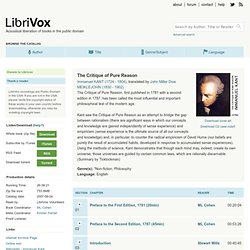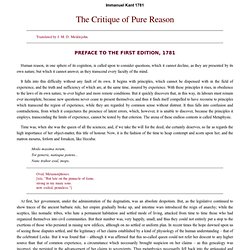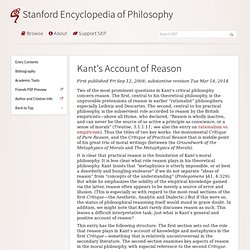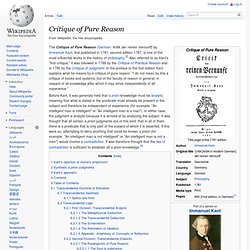Zoom
Trash

TCOPR Bittorrent Sync Folder:
Thing-in-itself (philosophy) Table of Contents. LibriVox, The Critique of Pure Reason. Immanuel KANT (1724 - 1804), translated by John Miller Dow MEIKLEJOHN (1830 - 1902) The Critique of Pure Reason, first published in 1781 with a second edition in 1787, has been called the most influential and important philosophical text of the modern age.

Kant saw the Critique of Pure Reason as an attempt to bridge the gap between rationalism (there are significant ways in which our concepts and knowledge are gained independently of sense experience) and empiricism (sense experience is the ultimate source of all our concepts and knowledge) and, in particular, to counter the radical empiricism of David Hume (our beliefs are purely the result of accumulated habits, developed in response to accumulated sense experiences). Using the methods of science, Kant demonstrates that though each mind may, indeed, create its own universe, those universes are guided by certain common laws, which are rationally discernable. (Summary by Ticktockman) Genre(s): *Non-fiction, Philosophy Language: English. The Critique of Practical Reason.
The Critique of Pure Reason by Immanuel Kant 1781. Immanuel Kant 1781 Translated by J.

M. D. Meiklejohn. Human reason, in one sphere of its cognition, is called upon to consider questions, which it cannot decline, as they are presented by its own nature, but which it cannot answer, as they transcend every faculty of the mind. It falls into this difficulty without any fault of its own. Time was, when she was the queen of all the sciences; and, if we take the will for the deed, she certainly deserves, so far as regards the high importance of her object-matter, this title of honour. Modo maxima rerum, Tot generis, natisque potens... Ovid, Metamorphoses. At first, her government, under the administration of the dogmatists, was an absolute despotism. For it is in reality vain to profess indifference in regard to such inquiries, the object of which cannot be indifferent to humanity. Kant's Account of Reason. First published Fri Sep 12, 2008; substantive revision Tue Mar 18, 2014 Two of the most prominent questions in Kant's critical philosophy concern reason.

The first, central to his theoretical philosophy, is the unprovable pretensions of reason in earlier “rationalist” philosophers, especially Leibniz and Descartes. The second, central to his practical philosophy, is the subservient role accorded to reason by the British empiricists—above all Hume, who declared, “Reason is wholly inactive, and can never be the source of so active a principle as conscience, or a sense of morals” (Treatise, 3.1.1.11; see also the entry on rationalism vs. empiricism).
Thus the titles of two key works: the monumental Critique of Pure Reason, and the Critique of Practical Reason that is middle point of his great trio of moral writings (between the Groundwork of the Metaphysics of Morals and The Metaphysics of Morals). It is clear that practical reason is the foundation of Kant's moral philosophy. 1.
COPR Section 1. COPR Section 2. COPR Section 3. COPR Section 4. Critique-pure-reason6x9. Critique of Pure Reason, wikipedia. The Critique of Pure Reason (German: Kritik der reinen Vernunft) by Immanuel Kant, first published in 1781, second edition 1787, is one of the most influential works in the history of philosophy.[2] Also referred to as Kant's "first critique," it was followed in 1788 by the Critique of Practical Reason and in 1790 by the Critique of Judgment.

In the preface to the first edition Kant explains what he means by a critique of pure reason: "I do not mean by this a critique of books and systems, but of the faculty of reason in general, in respect of all knowledge after which it may strive independently of all experience. " Before Kant, it was generally held that a priori knowledge must be analytic, meaning that what is stated in the predicate must already be present in the subject and therefore be independent of experience (for example, "An intelligent man is intelligent" or "An intelligent man is a man").
Kant's rejection of Hume's empiricism[edit] Synthetic a priori Judgments[edit] Dedication. Immanuel Kant (1724–1804): Critique of Pure Reason and Prolegomena to Any Future Metaphysics. Summary Kant published the Critique of Pure Reason in 1781.

It is very long and almost unreadable due to its dry prose and complex terminology. Kant tried to ease his readers’ confusion by publishing the Prolegomena to Any Future Metaphysics two years later. While it is hardly a page-turner, the Prolegomena is much briefer than the Critique and much more accessible in style, making it a valuable entry point to Kant’s metaphysics and epistemology. Kant’s primary aim is to determine the limits and scope of pure reason. Kant draws two important distinctions: between a priori and a posteriori knowledge and between analytic and synthetic judgments. Kant argues that mathematics and the principles of science contain synthetic a priori knowledge. The fact that we are capable of synthetic a priori knowledge suggests that pure reason is capable of knowing important truths.
Analysis. The Critique of Pure Reason by Immanuel Kant.